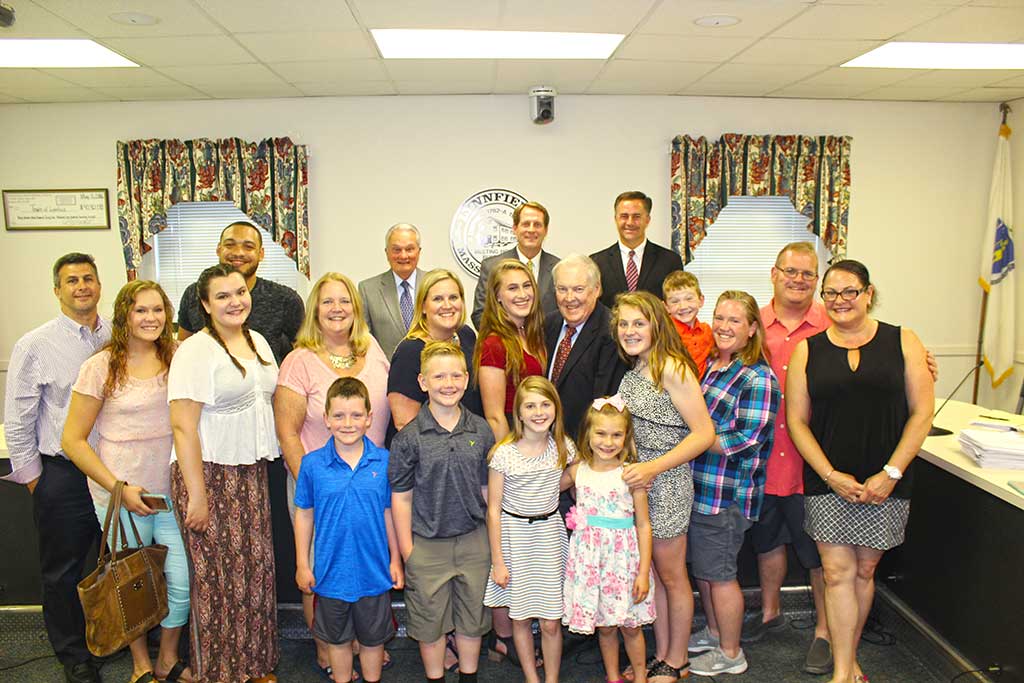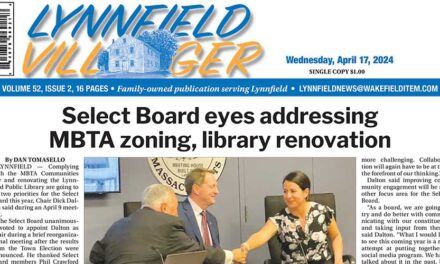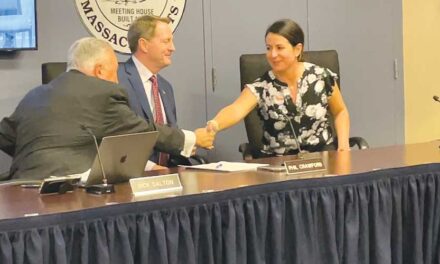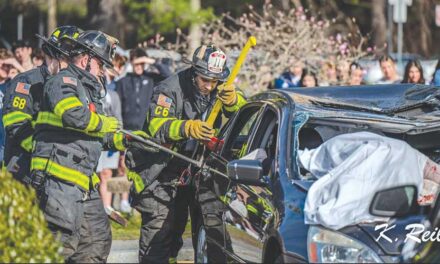
“MR. LYNNFIELD” Joe Maney (center right) is surrounded by his children, grandchildren, in-laws along with the 2017 Board of Selectmen (back row, from left): Dick Dalton, Phil Crawford and Chairman Chris Barrett, to celebrate the naming of the selectmen’s meeting room as the “H. Joseph Maney Meeting Room” on Monday night. (Maureen Doherty Photo)
Published in the June 14, 2017 edition
By MAUREEN DOHERTY
LYNNFIELD — Back in 1968, when H. Joseph Maney was first elected to the Board of Selectmen, it is unlikely that he envisioned this moment 50 years hence.
But here he stood Monday night, beaming, surrounded by a room overflowing with his smiling children and giggling grandchildren as the selectmen of 2017 voted to rename their meeting room at Lynnfield’s Town Hall in his honor.
In keeping with the board’s new policy of requiring public hearings to be held whenever a request is made to name a public space after an individual or group, Chairman Chris Barrett opened Monday’s hearing by recalling that when he first proposed this policy last month only one person in the audience rose to speak on the matter.
“As I said that night, it was to be done in very rare cases and sparingly, and someone actually stood up and confirmed that we should do that, and he had a tremendous amount of experience in town government to say that the town of Lynnfield takes it very seriously when you name anything in the community after anybody. That person was Mr. Maney. He didn’t know it at the time, but in back of my mind I was thinking ‘How can we best honor who I think is our best public servant?’” Barrett said.
Barrett also offered Maney an apology. “I shortchanged you by a couple of years. You actually have over 50 years of service to the town of Lynnfield. This has been a long time coming.”
“‘Mr. Lynnfield’ is an appropriate name for Mr. Maney,” Barrett said before turning the floor over to Selectman Dick Dalton.
Dalton said he it was his “privilege” to play “a small part” in naming this room in Maney’s honor and commended Barrett for proposing it.
“Dedicating this room in honor of Mr. Maney is a much-deserved recognition of the man I call ‘Mr. Lynnfield.’ He has been for decades, and continues to be, a man dedicated to our town. He exemplifies all that is good about public service and is a role model for all who serve this community,” Dalton said.
Dalton described him as a “dignified gentleman and a man of quiet determination,” adding that “when Joe speaks, people listen,” which was reminiscent of the old EF Hutton commercial because he has earned the community’s respect.
Dalton said that over the years the town has reaped the benefits of public service, whether elected or appointed, from “many talented and well-meaning individuals” but none for the length of service as Maney.
“Most people had a limited shelf life. Professional demands, public service and family obligations competed for their time. And after a while, managing those demands proved to be a daunting task. And that’s what makes Joe’s lifetime of service so remarkable,” Dalton said. “No one will ever equal his longevity – but more importantly I doubt anyone can ever equal the overall contribution that Joe Maney has made to this community.”
Dalton praised Maney for making these contributions to the town without “fanfare” or “a personal agenda to promote.”
“His only agenda has always been the best interests of the residents of Lynnfield,” Dalton said.
Selectman Phil Crawford quipped, “How do I follow that?” Then added, “There isn’t anybody in this town that is more deserving of being named ‘Mr. Lynnfield’ or having this town office named after him. Congratulations. You are a great role model to both your family and everyone in town, and you are certainly the exemplary model for what public service means.”
Barrett added, “I’d like to thank your family tonight for well over 50 years of you giving your father to the community. I know what it’s like right now. I have a young family myself and right now my kids are playing sports but I’ve chosen to dedicate myself to the town of Lynnfield and I genuinely mean it; it is because of Mr. Maney that I sit here today. I saw a lot of my town fathers stand up like they have over the last couple of decades. It’s the least I can do. My service to my community is my way of thanking Mr. Maney for all you’ve done.”
Barrett recounted Maney’s significant resume of well over 50 years of service, including as a selectman, chairman of the Charter Commission, Town Moderator (the longest-serving at 18 years), Town Administrator (from 1992-2003) and 28 continuous years – and counting – on the L.I.F.E. Board of Directors.
The vote to name the selectmen’s meeting room in honor of H. Joseph Maney was unanimous and came with much applause. Dalton also thanked the Bob and Lauri Priestley for providing the framed portrait of Maney that will be hung in the room beside the sign that Town Administrator Jim Boudreau said would be ordered soon.
“This photograph captures you well and your presence will always be strong here in the town of Lynnfield at Town Hall,” Barrett said.
The Lynnfield of yesteryear
After the vote, Maney offered a few words, thanking the board for the honor and noting that he had spent much time in this room as well as the two adjacent rooms over the years.
“I’d like to mention a couple comments about the time back in 1968 when I was first elected selectman. Back in the day we didn’t have a town administrator or an executive assistant. We had a clerk who was part-time. He typed the minutes of the meeting on an electric typewriter using carbon paper so you’d get four copies.”
This meant that the selectmen “had to do the heavy lifting,” he explained, adding, “We didn’t have a town charter in those days either. The town government was put together by accepting certain sections of the Mass. General Laws. The selectman position was created by accepting a provision of the General Laws and the police and fire department were as well. You had a choice between a strong chief and a weak chief, and we chose a strong fire chief and a weak police chief. The difference is that in a strong chief, the chief hires all the employees and writes the rules and regulations whereas with a weak chief, the Board of Selectmen does that. So our charter is, in effect, closer to a weak chief.”
“The town clerk, town treasurer and the tax collector were also elected. The DPW did not exist. We had an elected road commissioner, an elected tree warden, and a three-person Park and Cemetery Commission,” Maney said.
“Prior to the charter, which was adopted in 1971, we had 14 elected positions and that changed to six. The charter was on the ballot in 1971 and it had general support from the residents and the town employees but on the Thursday before the Monday election, one selectman, the person who was running against me at the time, took out an ad in the Weekly News in opposition to the charter. So while I was running for re-election for a second term and won by 700 votes, the charter only won by about 19 votes. There was a recount and there was no change to that,” he recalled.
“That’s a little perspective on the history on the town, so thank you again very much,” Maney said.




